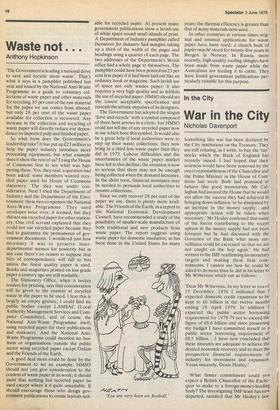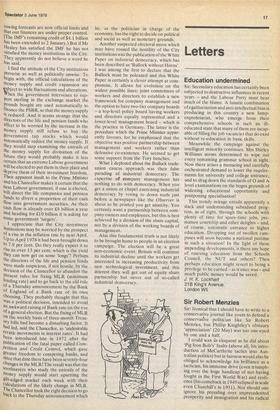In the City
War in the City
Nicholas Davenport
Something like war has been declared by the City institutions on the Treasury. They are still refusing, as I write, to buy the lap' stocks which the Bank of England has recently issued. I had hoped that their sourness would have been removed by the sweet reasonableness of the Chancellor and the Prime Minister in the House of Corn' mons last week. Both had promised to behave like good monetarists. Mr Callaghan had assured the House that he would not allow the success they had achieved in bringing down inflation `to be dissipated by an increase in the money supply.. .and appropriate action will be taken when necessary.' Mr Healey confessed that some of the forces contributing to the recent upturn in the money supply had not been foreseen but he had discussed with the Governor of the Bank what more sur veillance could be exercised `so that we are not caught on the hop again.' He had written to the IMF reaffirming his monetary targets and making them firm com
mitments. I cannot see how he could be
asked to do more than he did in his letter to Mr Witteveen which ran as follows: 'Dear Mr Witteveen, In my letter to you of 15 December, 1976 I indicated. that I expected domestic credit expansion to be kept to £6 billion in the twelve months ending 18 April 1979. In addition I' expected the public sector borrowing requirement for 1978-79 not to exceed the figure of £8.6 billion and since presenting my budget I have committed myself to a public sector borrowing requirement of £8.5 billion. . .I have now concluded that these amounts are adequate to achieve the desired economic recovery and to meet the prospective financial requirements of industry for investment and expansion. Yours sincerely, Denis Healey.'
rowing forecasts are now official limits and that our finances are under proper control. (The IMF's remaining credit of $4.1 billion has been extended to 2 January.) But if Mr Healey has satisfied the IMF he has not satisfied the money institutions in the City. They apparently do not believe a word he has said.
I find the attitude of the City institutions Perverse as well as politically unwise. To begin with, the official calculations of the Money supply and credit expansion are tu,bject to wide fluctuations and alterations. When the government intervenes to supPort sterling in the exchange market the Pounds bought are used automatically to !mance the PSBR, so that the money supply IS reduced. And it seems strange that the directors of the life and pension funds who affect to be worried by the increase in the Money supply still refuse to buy the government tap stocks which would automatically reduce the money supply. If they would stop examining the entrails of the money supply for divination of the future they would probably make it less certain that an extreme Labour government Will be elected to put them in their place and deprive them of their investment freedom. Their apparent insult to the Prime Minister and his Chancellor makes it certain that the next Labour government, if one is elected, Will direct the life companies and pension funds to divert a proportion of their cash flow into government securities. As their cash flow is already over £8 billion a year and heading for £10 billion it is asking for some government 'targets'.
I appreciate that the City investment institutions may be worried by the prospect of a rise in the inflation rate by next April. UP to April 1978 it had been brought down to 7.9 per Cent. Do they really expect it to rise to over 13 per cent, which is the yield they can now get on some 'longs'? Perhaps the directors of the life and pension funds Were made suspicious, if not hostile, by the decision of the Chancellor to abandon the Present rules for fixing MLR (minimum lending rate) and to go back to the old rule of a Thursday announcement by the Bank of England of a Bank rate of its own Choosing. They probably thought that this Was a political decision, intended to avoid an awkward raising of Bank rate on the eve of a general election. But the fixing of MLR un the weekly basis of three-month Treasury bills had become a disturbing factor. It had led, said the Chancellor, to 'undesirable erratic movements in interest rates'. It had been introduced late in 1972 after the Publication of the fatal paper called ComPetition and Credit Control, which gave greater freedom to competing banks, and since that date there have been seventy-four Changes in the MLR! The result was that the soothsayers who study the entrails of the money supply would start upsetting the gilt-edged market each week with their calculations of the likely change in MLR. The Chancellor took the right decision to go back to the Thursday announcement which
he, as the politician in charge of the economy, has the right to decide on political and social as well as monetary grounds.
Another suspected electoral move which may have roused the hostility of the City institutions was the publication of the White Paper on industrial democracy, which has been described as 'Bullock without Horns'. I was among the first to declare that the Bullock must be poleaxed and this White Paper is certainly a clever attempt at compromise. It allows for evolution on the widest possible lines: joint committees of workers and directors to establish a new framework for company management and the option to have two-tier company boards — a top-level policy board having workers and directors equally represented and a lower-level management board — which is the practice in Germany. The latter is the procedure which the Prime Minister apparently favours, for he emphasised that the objective was positive partnership between management and workers rather than defensive co-existence. He seemed to get some support from the Tory benches.
What I deplored about the Bullock tradeunion caucus approach was their false parading of industrial democracy. The expertise of company management has nothing to do with democracy. When you get a union or chapel exercising industrial democracy by voting to down tools just before a newspaper like the Observer is about to be printed you get anarchy. You certainly want a partnership between company owners and employees, but this is best achieved by a division of the share capital, not by a division of the working boards of management.
Alas this fundamental truth is not likely to be brought home to people in an election campaign. The election will be a great non-economic event. Britain will continue its industrial decline until the workers get interested in increasing productivity from new technological investment, and this interest they will get out of equity share partnership but never out of so-called industrial democracy.



































 Previous page
Previous page